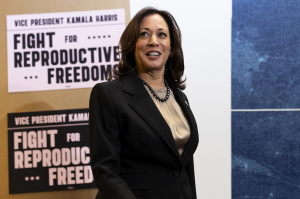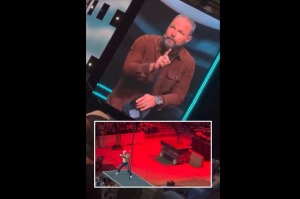Gen Z has a lot to share, and now is the time to listen

Several years ago, I sat with a Young Life leader as he processed the efficacy of working in what he called an “activist school.” He was impressed that the students he worked with were passionate and invested in several areas, but he was struck that they weren’t “faith-based.” Leaning toward me, he said, “They want to just plant trees and save whales.” My response to him was as simple then as it is today: Activism may be the way they are attempting to address the brokenness and pain in the world, and many of their concerns are Kingdom concerns. What an opportunity you have to join them and find a place of connection. Those are few and far between. Once you see it, take it!
For 80 years, at our best, Young Life has done just that. A Barna study revealed that 4.9 million U.S. adults participated in Young Life as students and are still practicing their faith today. Of these, 1.1 million credit Young Life as the main influence in developing their faith, and 3.2 million credit Young Life as one of the main influences in developing their faith.
This is not an insignificant number. Let me be clear on what it doesn’t represent: It doesn’t mean that Young Life is the be-all and end-all. Instead, what it does mean is that the model Young Life has used over the years is one that transfers to any generation: When we desire to see young people come to faith, and we combine that with making ourselves available and listening to the Spirit’s promptings, we have greater opportunities to see our young people trust in Jesus and grow to become healthy, mature followers of Jesus.
“But what about Gen Z?” many people ask me. “Are they different than other generations?”
Like every other generation, the way into the hearts of this younger generation is by being able to take the big story of the Gospel and identify the places of intersection where the timeless nature of the good news intersects with kids today. Let me share just a few ways we can do this well.
Remember the global context
We are living through a global pandemic which has heightened our fears and concerns. It’s revealed how healthy — or not — we are emotionally and spiritually. The challenges and hurdles that COVID-19 has thrown our way have raised to the surface the trauma of loneliness, a lack of community, and a lack of physical touch.
As adults, it’s hard enough. Now imagine you are 10 or 14 or 18, and you are already dealing with the struggles that come with growing up and discovering who you are, and who God has made you to be. And now you must deal with a global pandemic that has impacted school, friendships, and regular activities.
This pandemic will leave an indelible mark on this generation. We have the opportunity to walk with this younger generation in their sadness, their social uncertainty, and their search for meaning. The questions are the same as they have always been but perhaps are more keenly felt today than ever.
Be sensitive to the cultural moment
The perception of Christianity today as a religion that is too narrow, too politicized, and too archaic is all too common. When once apologetics was the major vehicle for sharing our faith, today emotions rule the day. “What feels right?” is a continual prompt for this younger generation as they make decisions of what matters and what doesn’t.
Several years ago, a CEO explained to me that the questions people are asking today are different than the ones they were asking 30-40 years ago. He shared that we went from “Is Christianity true?” to “Is Christianity good?” As those who share the Gospel, I would hope our answer to both would be a resounding YES.
However, these are the wrong questions, and as we reach this generation, we must be clear on that. The question today isn’t “Is Christianity good?” Instead, it’s “Is Jesus good?” “Is Jesus true?” As we engage this younger generation in faith conversations, we must check ourselves. We aren’t defending a specific religion or a set of religious codes. We are offering them the unconditional love of Jesus. When we remember that this cultural moment requires us to push even more into Jesus, we also begin to have more fun sharing the Gospel.
Find the connection points
Activism is the new evangelicalism. I say that as someone deeply committed to the proclamation of the Gospel. Those of us who wrestle with the tension of words vs. works must pop our insulated bubbles and be exposed to the world in which Gen Z is growing up — a world being crushed by systemic and individual sin. The problems of our world demand response and this new generation is committed to finding the answers.
Sadly, however, as they wrestle with the problems they encounter, many aren’t running to the Church for answers. The Church simply isn’t at the forefront of providing solutions for the very complex world in which we live. Gen Z cares about racism and inequality. They care about maternal health care and clean water and rainforests surviving for another million years.
To reach Gen Z, we must be willing and available to talk on all of these issues. We must never separate this world from the next, the physical from the spiritual, the soul and the body. And because this generation can recognize inauthenticity and a lack of integrity from a mile away, we must commit ourselves to understand the issues of the day. We must be people who are like both the “men of Issachar” and the Bereans — desiring to understand our world and how the Bible speaks to our world.
Be present
The Gospel changes our world, but it usually does so in small ways — one conversation, one hug, one friendship at a time. When this younger generation has the opportunity to disconnect from a 24/7 media culture and a 24/7 cyberbullying, ghosting, snapping culture, hopefully, there they will find us — people who love Jesus and who would love nothing more than to sit with them face-to-face.
Sharing the Gospel today is both harder and easier than in the past. It is harder because it requires a deep commitment from each of us to be present and available at any moment to talk with our kids about what’s on their minds. With the advent of mobile phones, this has become harder and harder. But it’s also easier to share the Gospel because with struggle and pain (like COVID-19 has brought on) comes a desire to find answers to ease our restless minds and hearts.
Like all generations before them, little things matter, and big things matter. Being available at 10 p.m. to talk about how someone at school said an unkind word to them is just as important as being at their regional baseball game.
I like to invite Christians to be “micro innovators.” We don’t need to change the world on a macro scale — we just need to always be looking for small ways to make the Gospel known to one person at a time. That’s how this generation will be reached with the love of Jesus.
Remember the global context. Be sensitive to the cultural moment. Find the connection points. Be available. And always believe that Jesus wants to work through you to reach this next generation. That’s the recipe Young Life has used for 80 years, and one I believe will lead to countless millions more coming to faith in Christ in the decades to come.
Ken Tankersley is senior vice president of Young Life Global Innovation and Growth.




























